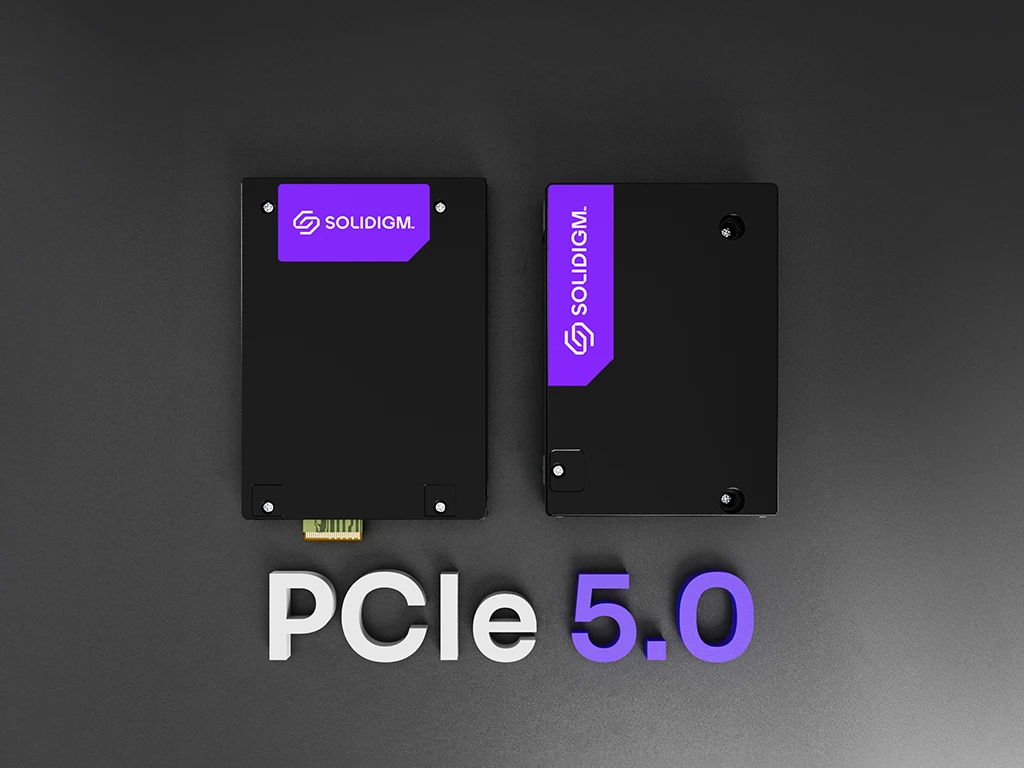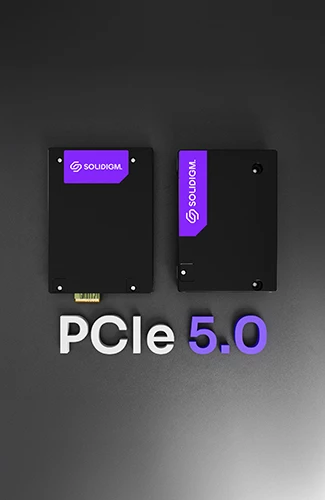Solidigm™ D7-PS1010 & D7-PS1030 Product Brief
The Fastest PCIe 5.0 SSD on the Planet 1
The Solidigm™ D7-PS1010 and D7-PS1030 SSDs are built to accelerate demanding modern enterprise and cloud data center workloads, and to power your AI/ML data pipeline.


Our extensive SSD portfolio expands into PCIe 5.0 with the Solidigm D7-PS1010 and D7-PS1030 drives, powerful additions to the high-performance D7 series. These drives provide standard endurance and mid-endurance, respectively, across a range of capacities in the industry’s most popular form factors. Combining class-leading performance and performance optimizations for real-world IO conditions,2 the Solidigm D7-PS1010 and D7-PS1030 efficiently accelerates a wide range of enterprise, cloud, and AI/ML workloads, regardless of PCIe interface. Designed and tested with zero tolerance for data errors3 and consistent performance across the life of the drive,4 they can be deployed with the utmost confidence.
Solidigm D7-PS1010 and Solidigm D7-PS1030 capacities range from 1.92TB to 15.36TB and 1.6TB to 12.8TB, respectively. Both drives are available in E3.S and U.2 form factors.
 Table 1. Performance and features
Table 1. Performance and features
 Figure 1. Product specs and workloads
Figure 1. Product specs and workloads
Next-Gen Performance and Efficiency, Elevated
Gen/Gen Performance5
The next generation of high-performance SSDs has arrived. Experience significant improvements to performance, latency reduction, and QoS, including double the throughput, compared to the previous generation, the Solidigm D7-P5520 and D7-P5620.
 Table 2. Solidigm D7-PS1010 and D7-PS1030 performance
Table 2. Solidigm D7-PS1010 and D7-PS1030 performance
PCIe 5.0 Leadership
Having immediate access to data has never been more important. Class-leading performance improvements, plus our deep, industry-wide technical insight, provide drive performance calibrated for the real world, setting the pace not only in four corner performance but in IO conditions found across a range of mainstream workloads.
 Table 3. PCIe 5.0 competitive spec comparison
Table 3. PCIe 5.0 competitive spec comparison
Optimized for Real-World Workloads
Going beyond four corner performance, Solidigm uses its deep knowledge of customer workloads to optimize performance for real-world IO conditions found in workloads such as AI/ML, HPC, databases, general purpose servers, and more.
High performance computing (HPC) is the ability to process data and perform complex calculations at high speeds. Clusters are networked to data storage to capture, feed, and ingest that data to optimize performance output. With the Solidigm D7-PS1010, HPC runs up to 37% higher throughput compared to our previous generation drive.6
General purpose servers (GPS) support a range of workloads that span databases, email, unified communications, content delivery networks, and more. Due to the nature of these servers, throughput and latency in a mixed environment is highly valued. Compared to a competitor drive, the Solidigm D7-PS1010 accelerates 80/20 sequential/random read performance by up to 50% and reduces latency up to 33%.7
Online Analytical Processing (OLAP) databases help organizations process large amounts of data from multiple sources and categorize it to provide valuable insights for any business. Solidigm D7-PS1010 can run this process up to 15% faster compared to a similar manufacturer drive, and over double the speed compared to the previous generation drive.8
Cloud compute services are utilized across a wide array of scenarios such as data backup, disaster recovery, databases, email, virtual desktop, and more. These usages present a highly random, mixed workload environment, which values low latency to improve experience. When deployed in an Online Transaction Processing (OLTP) environment, Solidigm D7-PS1010 delivers up to 65% better bandwidth compared to a competitor drive.9 In server-based storage solutions, where VMs generate a mix of reads and writes that can be highly random or sequential, Solidigm D7-PS1010 will accelerate these workloads. Compared to similar drives from competition, the Solidigm D7-PS1010 can push these workloads to over 66% faster sequential write throughput.10
AI Pipeline Workloads
The rapid growth of artificial intelligence has caused a boom in compute power. The worst thing you can do to your graphics processing unit (GPU) efficiency is to throttle performance with hard disk drive (HDD) limitations. Solidigm D7-PS1010 and D7-PS1030 placed in an all-flash performance tier helps overcome HDD performance, endurance, and reliability limitations. Built to excel at every stage of the AI data pipeline, you can experience up to 50% higher throughput in certain pipeline phases, compared to similar drives by other manufacturers.11
Recommended use cases for the Solidigm D7-PS1010 and D7-PS1030 in AI data pipelines:
- As NVMe Data Cache Drive in GPU servers
- In All-Flash High-Performing Tier supporting lower-performing HDDs
 Figure 2. Cloud and on-prem use cases
Figure 2. Cloud and on-prem use cases
Best-in-Class Energy Efficiency
Solidigm D7-PS1010 and D7-PS1030 improves operational efficiency without sacrificing performance, while delivering world-class consistency, quality, and reliability. With class-leading performance efficiency, Solidigm D7-PS1010 offers up to 70% better energy efficiency compared to similar drives by other manufacturers,12 allowing for more efficient energy and operation. With five flexible power states ranging from 5W to 25W, you can control your power consumption to meet your workload needs.
Modern Security and Manageability Features on the Leading Protocols
Building on our previous generation PCIe 4.0 data center SSDs, the Solidigm D7-PS1010 and D7-PS1030 offer a broad feature set aligning with the industry’s most desired and essential requirements.
 Table 4. Product features
Table 4. Product features
Solidigm™ D7-PS1010 & D7-PS1030 Product Brief
Deploy with Confidence
Solidigm D7-PS1010 and D7-PS1030 SSDs are designed and tested with an unwavering focus on quality, reliability, and performance consistency, so you can deploy them with the utmost confidence.
- Data Protection: With enhanced PLI testing, an UBER rate tested to 1E-18, which is 100x beyond JEDEC specification,13 and SDC testing that continues to lead the industry,14 Solidigm has strengthened its legacy of reliability to help protect your data.
- Drive reliability: Continued proven reliability delivers AFR significantly better than JEDEC in high-volume manufacturing.15 Margin-corner testing and robust RDT help the drives perform reliably when deployed in real-world conditions.
- Consistency: Up to 90% IOPS consistency provides consistent performance over the life of the drive,16 allowing the drive to meet workload requirements over the duration of the warranty.17
Choose the right storage for AI workloads

SSDs optimized for AI
Explore our class-leading PCIe 5.0 SSDs. For standard endurance or mid-endurance; mainstream, write-centric, or mixed workloads, find the right capacity and form factor for your needs.

Storage for the AI Era
Our leading combination of high capacity and high performance helps our partners not only get to the market more quickly, but also save money, power, and space. See why industry-leading AI companies are choosing Solidigm SSDs.
Notes
1. Comparing product specifications and measured real-life workload performance across widely shipping PCIe 5.0 data center SSDs at the industry’s highest volume capacity point of 3.84TB (using Solidigm 2023 and 2024 shipments as industry representative data).
2. Solidigm technology, based on a combination of Intel® analysis and publicly available storage workload research material.
3. Solidigm drives are tested to 1E-18 under full range of conditions and cycle counts throughout the life of the drive which is 100X higher than 1E-16 specified in JEDEC – Solid State Drive Requirements and Endurance Test Method (JESD218). https://www.jedec.org/standards-documents/focus/flash/solid-state-drives
4. Refer to Solidigm™ D7-PS1010 product specifications for IOPS consistency. Solidigm expects up to 5% variation in throughput between drive-to-drive runs. IOPS variability measured after adjusting SSD cycle limit to simulate end of life behavior. Results are estimated or simulated. Actual results may vary.
5. As compared to previous generation Solidigm™ D7-P5520. See Solidigm D7-PS1010/PS1030 product specifications for performance, exceptions and modifications for compliance/support details.
6. Workload IO characteristics based on research of publicly available materials conducted by Solidigm. Comparing Solidigm D7-P5520 3.84TB (2.63GB/s) and Solidigm D7-PS1010 3.84TB (3.61GB/s). System Configuration: System Config 1, 2, see Appendix for config details. IO measured using FIO tool.
7. Workload IO characteristics based on research of publicly available materials conducted by Solidigm. Solidigm D7-PS1010 3.84TB (13.50GB/s 152us) and Samsung PM1743 3.84TB (9.03GB/s 228us).
8. Workload IO characteristics based on research of publicly available materials conducted by Solidigm. Comparing Solidigm D7-P5520 3.84TB (1M Seq. 70R/30W QD32 5.39GB/s), Solidigm D7-PS1010 3.84TB (1M Seq. 70R/30W QD32 11.49GB/s) and Samsung PM1743 3.84TB (1M Seq. 70R/30W QD32 9.94GB/s). System Configuration: System Config 1 and System Config 2, see Appendix for config details. IO measured using FIO tool.
9. Workload IO characteristics based on research of publicly available materials conducted by Solidigm. Comparing Solidigm D7-PS1010 7.68TB (8KB RND 70/30 R/W QD128 3.82GB/s 339us), Samsung PM1743 7.68TB (8KB RND 70/30 R/W QD128 2.32GB/s 934us). System Configuration: System Config 3, see Appendix for config details. IO measured using FIO tool.
10. Workload IO characteristics based on research of publicly available materials conducted by Solidigm. Comparing Solidigm D7-PS1010 7.68TB (128KB Seq Write QD128 10.2 MB/s) vs Samsung PM1743 7.68TB (128KB Seq Write QD128 6.13 MB/s). System Configuration: System Config 3, see Appendix for config details. IO measured using FIO tool.
11. Workload IO characteristics based on research of publicly available materials conducted by Solidigm. Solidigm D7-PS1010 7.68TB (32KB SW QD32 9.03GB/s 113us) vs Samsung PM1743 7.68TB (32K SW QD32 6.03GB/s 170us) System Configuration: System Config 1 and 3, see Appendix for config details. IO measured using FIO tool.
12. Comparing 7.68TB, Samsung PM1743 and Solidigm D7-PS1010. Power is measured using Quarch Technology. D7-PS1010 (128KB SW QD128 IOPS/Watt 3,874), Samsung PM1743 (128KB SW QD128 IOPS/Watt 2,272). System Configuration: System Config 3, see Appendix for config details. Throughput measured using FIO tool.
13. Solidigm drives are tested to 1E-18 under full range of conditions and cycle counts throughout the life of the drive which is 100X higher than 1E-16 specified in JEDEC – Solid State Drive Requirements and Endurance Test Method (JESD218). https://www.jedec.org/standards-documents/focus/flash/solid-state-drives
14. Typical Reliability Demonstration Test involve 1K drives for 1K hours to levels down to 1E-18. Solidigm drives are tested at the neutron source at Los Alamos National Labs to measure SDC susceptibility to 1E-23 with modeling to 1E-25. In 3 generations of testing at Los Alamos, equivalent to over 5M years of operational use, zero SDC errors have been detected on Solidigm drives and no evidence of other suppliers testing at the facility has been observed.
15. Solidigm™ D7-PS1010 AFR data from device validation.
16. Refer to Solidigm™ D7-PS1010 product spec for IOPS consistency. IOPS variability measured after adjusting SSD cycle limit to simulate end of life behavior. Results are estimated or simulated. Actual results may vary.
17. Solidigm Warranty Policy can be found here: https://www.solidigm.com/support-page/warranty-rma.html
Comparison data is based on publicly available information. Products mentioned include:
System Configuration
System config 1: Server: Intel® Server System M50CYP, Mainboard: Intel® Server Board M50CYP2SB2U, Version: S2W3SIL4B; BIOS:SE5C6200.86B.4018.D65.2010201151; CPU: Intel® ICE LAKE - P5 4GXRAV D, CPU Sockets: 2, Number of Cores: 36; DRAM:DDR4 64GB, Linux Release 7.5.1804, Kernal version:3.10.0-862.el7.x86 64 used for Solidigm D7-P5220
System Config 2: Server: Dell Power Edge, Mainboard:095DFK, BIOS: A03, CPU: Intel® Xeon® Gold 6426Y, CPU Sockets 2, Cores:32, DDR5 64GB, OS: Kernal version: 3.10.0-862.el7.x86 64 Used for Samsung PM1743/Solidigm D7-PS1010
System Config 3: Server: SuperMicro ASG-2115S-NE332R, Mainboard: Super H13SSF, BIOS: 5.27, CPU: AMD EPYC 9374F, CPU Sockets 1, Cores:32, DDR5 128GB, OS: Kernal version: 3.10.0-862.el7.x86 64, Storage interface: E3.S AI Data Pipeline
System Config 4: Server: SuperMicro AS -2015CS-TNR, Mainboard: Super H13SSW, BIOS: 5.27, CPU: AMD EPYC 9374F, CPU Sockets 1, Cores:32, DDR5 128GB, OS: Kernal version: 3.10.0-862.el7.x86 64, Storage interface: U.2 Kioxia CM7
System Config 5: Server: Inventec-G225-B6, Mainboard: XiangyangMLB, BIOS: 5.27, CPU: AMD EPYC 9Y24, CPU Sockets 2, Cores:96, DDR5 128GB, OS: Kernal version: 3.10.0-862.el7.x86 64, Storage interface: U.2 Samsung PM9D3a
Power Measurements
System Config 3: Server: SuperMicro ASG-2115S-NE332R, Mainboard: Super H13SSF, BIOS: 5.27, CPU: AMD EPYC 9374F, CPU Sockets 1, Cores: 32, DDR5 128GB, OS: Kernal version:3.10.0-862.el7.x86 64, Storage interface: E3.S D7-PS1010, Samsung PM1743 and Kioxia CM7-R
System Config 5: Server: Inventec-G225-B6, Mainboard: XiangyangMLB, BIOS: 5.27, CPU: AMD EPYC 9Y24, CPU Sockets 2, Cores:96, DDR5 128GB, OS: Kernal version:3.10.0-862.el7.x86 64, Storage interface:U.2 Samsung PM9D3a
All information provided is subject to change at any time, without notice. Solidigm™ may make changes to manufacturing life cycle, specifications, and product descriptions at any time, without notice. The information herein is provided “as-is” and Solidigm does not make any representations or warranties whatsoever regarding accuracy of the information, nor on the product features, availability, functionality, or compatibility of the products listed. Please contact system vendor for more information on specific products or systems.
Performance results are based on testing as of dates shown in configurations and may not reflect all publicly available updates. See backup for configuration details. No product or component can be absolutely secure.
Performance varies by use, configuration, and other factors.
Refer to the spec sheet for formal definitions of product properties and features.
Solidigm technologies may require enabled hardware, software, or service activation. No product or component can be secure. Your costs and results may vary. Performance varies by use, configuration and other factors. Other names and brands may be claimed as property of others. Solidigm is committed to respecting human rights and avoiding complicity in human rights abuses. Solidigm products and software are intended only to be used in applications that do not cause or contribute to a violation of an internationally recognized human right.
Solidigm and the Solidigm logo are trademarks of Solidigm. All other trademarks are the property of their respective owners.
© Solidigm 2024. All rights reserved.